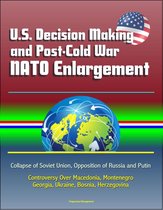The United States, the Soviet Union and the Geopolitical Implications of the Origins of the Cold War Ebook Tooltip Ebooks kunnen worden gelezen op uw computer en op daarvoor geschikte e-readers.
Afbeeldingen
Sla de afbeeldingen overArtikel vergelijken
- Engels
- E-book
- 9781783088010
- 30 oktober 2018
- Adobe ePub
Samenvatting
‘The United States, the Soviet Union and the Geopolitical Implications of the Origins of the Cold War, 1945–1949’ postulates that the geopolitical interests and needs of the superpowers led to the configuration of the post-war international order. Taking a long-term approach to the evolution of the system of states, it describes how the United States and the Soviet Union deployed their hard and soft power resources to create the basis for the institutionalization of the international order in the aftermath of World War Two. The main idea advanced by this book is that the origins of the Cold War should not be seen from the perspective of a magnified spectrum of conflict but should be regarded as a process by which the superpowers attempted to forge a normative framework capable of sustaining their geopolitical needs and interests in the post-war scenario. This book examines how the use of ideology and the instrument of political intervention in the spheres of influence managed by the superpowers was conducive to the establishment of a stable international order.
‘The United States, the Soviet Union and the Geopolitical Implications of the Origins of the Cold War, 1945–1949’ postulates that the element of conflict present in the early period of the Cold War served to demarcate the scope of manoeuvring available to each of the superpowers. This state of affairs denotes the existence of diverging geopolitical interests, acknowledged through the presence of well-demarcated spheres of influence. The book examines the notion that the United States and the Soviet Union were primarily interested in establishing the conditions for accomplishing their vital geostrategic interests, which required the implementation of social norms imposed in the respective spheres of influence, a factor that provided certainty to the spectrum of interstate relations after the period of turmoil that culminated in the outbreak of World War Two. Drawing on the example of the friction that affected Soviet-American relations at the end of World War Two, this book examines the circumstances that give rise to the construction of sound international orders and the functional values that sustain their existence.
‘The United States, the Soviet Union and the Geopolitical Implications of the Origins of the Cold War, 1945–1949’ starts by examining the manner in which great power management has served as an instrument of the process of re-institutionalization, with special emphasis on the geopolitical elements that underpinned the intervention of the superpowers in their spheres of influence and how this state of affairs impacted on the stability of the system of states that emerged after World War Two ended. The book also examines the implications of the process of de-institutionalization that took place in the system of states since the emergence of a unified Germany and how it led to the disruption of interstate relations in the European political order. The settlement of the German Question provided the wartime allies with an opportunity to deal with the problems that stemmed from the process of de-institutionalization of the international order that the United States facilitated through the enforcement of its vital geopolitical interests in Western Europe. Emphasizing the central role of ideology in the deployment of American geopolitical power in the aftermath of World War Two the book examines the way in which the Soviet Union contributed to institutionalizing the international order by establishing the parameters of intervention that would regulate interstate relations. There will also be an emphasis on the role of ideology in the formulation of the Soviet foreign policy in the post-war era. The book also examines the special geopolitical culture of Russia and the concept of Eurasianism as the reasons behind the establishment of the spheres of influence system that operated during the Cold War. This book discusses how the process of institutionalization that took place following World War Two can teach us about the configuration of the geopolitical mechanisms needed for reconfiguring international and regional orders after a period of military conflict.
Productspecificaties
Inhoud
- Taal
- en
- Bindwijze
- E-book
- Oorspronkelijke releasedatum
- 30 oktober 2018
- Ebook Formaat
- Adobe ePub
- Illustraties
- Nee
Betrokkenen
- Hoofdauteur
- Nicolas Lewkowicz
- Hoofduitgeverij
- Anthem Press
Lees mogelijkheden
- Lees dit ebook op
- Desktop (Mac en Windows) | Kobo e-reader | Android (smartphone en tablet) | iOS (smartphone en tablet) | Windows (smartphone en tablet)
Overige kenmerken
- Editie
- 1
- Studieboek
- Ja
EAN
- EAN
- 9781783088010
Je vindt dit artikel in
- Categorieën
- Taal
- Engels
- Boek, ebook of luisterboek?
- Ebook
- Beschikbaar in Kobo Plus
- Beschikbaar in Kobo Plus
- Beschikbaarheid
- Leverbaar
Kies gewenste uitvoering
Prijsinformatie en bestellen
De prijs van dit product is 17 euro en 99 cent.- E-book is direct beschikbaar na aankoop
- E-books lezen is voordelig
- Dag en nacht klantenservice
- Veilig betalen
Rapporteer dit artikel
Je wilt melding doen van illegale inhoud over dit artikel:
- Ik wil melding doen als klant
- Ik wil melding doen als autoriteit of trusted flagger
- Ik wil melding doen als partner
- Ik wil melding doen als merkhouder
Geen klant, autoriteit, trusted flagger, merkhouder of partner? Gebruik dan onderstaande link om melding te doen.








